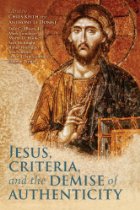
 Morna D. Hooker cried out in the academic wilderness forty years ago against the validity of “authenticity criteria” — criteria of coherence, criteria of dissimilarity, in particular, but also of embarrassment, multiple attestation, etc — then being used to supposedly uncover the historical Jesus. Her reflections on the state of play since that time are found in her foreword to Jesus, Criteria, and the Demise of Authenticity and can be downloaded as a pdf file. (It begins with the ‘I told you so’ of the title for this blog.)
Morna D. Hooker cried out in the academic wilderness forty years ago against the validity of “authenticity criteria” — criteria of coherence, criteria of dissimilarity, in particular, but also of embarrassment, multiple attestation, etc — then being used to supposedly uncover the historical Jesus. Her reflections on the state of play since that time are found in her foreword to Jesus, Criteria, and the Demise of Authenticity and can be downloaded as a pdf file. (It begins with the ‘I told you so’ of the title for this blog.)
Her arguments in 1970 and 1972 were ignored, such (Morna believes) was the pressure on her peers to “produce a scientific result”. Criteria were seized upon by theologians as if they could be worn as badges proving to the world that they were not letting their religious beliefs influence their research, “but were motivated by the same scholarly impartiality shown by those working in other disciplines.”
Chris Keith supports Morna Hooker’s earlier views in his first chapter of Jesus, Criteria, and the Demise of Authenticity, and adds to her criticisms that the problems is
also with the notion that the proper historical task consists of digging in the Gospels in this manner in the first place, and especially with assuming that one can get closer to the actual past by eliminating Christian interpretation from the reconstruction effort. (p. 48)
Keith reinforces Hooker’s view when he writes that
criteria reached a quasi-canonical status because of their appearance that they were objective scientific common ground between scholars of different theological persuasions. In the excitement and effort to function like the hard sciences, then, scholars overlooked (or were simply unconcerned with) the criteria approach’s foundations. (pp. 27-28)
This post looks at those foundations and returns to one of Morna Hooker’s earlier articles. So before discussing Chris Keith’s chapter I thought it useful to cover one of Hooker’s publications on which his own chapter is based.
It is “On Using the Wrong Tool” and appeared in Theology in 1972.
Morna Hooker (MH) argues that the tools used by scholars to discover the historical Jesus “cannot do what is required of them.”
Authenticity grew out of form-criticism so MH begins with that foundation. Continue reading “‘I told you so!’ Why Criteria for Historical Jesus Studies Don’t Work”
